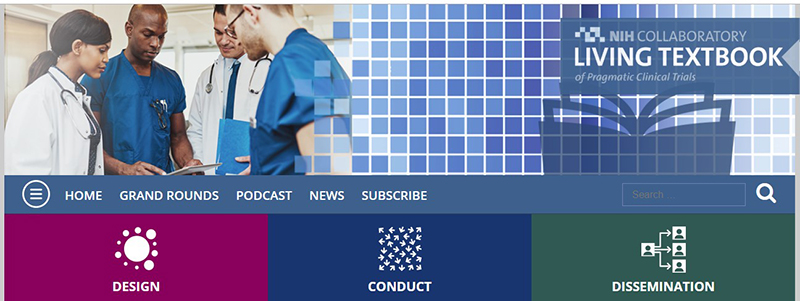 The goal of the NIH Health Care Systems (HCS) Research Collaboratory program is to engage health care delivery organizations like clinics or hospitals as research partners in the conduct of pragmatic clinical trials. Pragmatic clinical trials take place at the site of care and are designed to provide real world evidence on the benefits and risks of treatment options for health care providers and patients. The NIH Collaboratory generates and widely disseminates best practices for conducting pragmatic clinical trials through a number of outreach activities, including an online living textbook and weekly Grand Rounds webinars.
The goal of the NIH Health Care Systems (HCS) Research Collaboratory program is to engage health care delivery organizations like clinics or hospitals as research partners in the conduct of pragmatic clinical trials. Pragmatic clinical trials take place at the site of care and are designed to provide real world evidence on the benefits and risks of treatment options for health care providers and patients. The NIH Collaboratory generates and widely disseminates best practices for conducting pragmatic clinical trials through a number of outreach activities, including an online living textbook and weekly Grand Rounds webinars.
The HCS Research Collaboratory supports a series of pragmatic clinical trials in medical centers across the country and addresses a range of pressing public health concerns including cancer screening, pain management, kidney dialysis, hospital-acquired infections, medication adherence, suicide prevention, and advanced care planning. For more information about these trials and their outcomes please see the public health relevance page and program highlights.
To provide critical infrastructure that addresses the unique challenges of performing clinical trials in real world settings and to disseminate lessons learned, the program supports a Collaboratory Coordinating Center, the NIH Collaboratory. The NIH Collaboratory aids the design and rapid execution of pragmatic clinical trials, and develops and disseminates standard methods and best practices for working with health care delivery organizations as research partners through a living textbook.
Visit the NIH Collaboratory website for detailed information on:
- Grand Rounds – a weekly webinar on pragmatic clinical trials
- Pragmatic Clinical Trial Projects – demonstration projects that address major public health concerns
- Collaboratory Organizational Structure – information about the structure of the NIH Collaboratory
- Cores – working groups that provide support and generate guidance




